February 2020: Olive Tree

Volume IV/Issue 11/February 2020


From The Editorial Desk
For February: The Month of the Holy Family
FINDING JOY AND CONTENTMENT IN HOME LIFE
-
Role As Wives And Mothers In The Home.
This is a very relevant and important subject. It is and has been under attack in a very real way in our society, especially in the last forty years. I believe Satan is well aware that if we let our guards down in this area, he has gotten his foot in the door of our homes.
We want to define what the role is as wives and mothers. Starting in Genesis after God created Adam and Eve , He said in chapter 2 verse 24 :"Wherefore a man shall leave father and mother, and shall cleave to his wife: and they shall be two in one flesh." We see the beginning of the first home. A short while later after Adam and Eve sinned, God was speaking again in chapter 3 -starting at verse 16-19. “To the woman also he said: I will multiply thy sorrows, and thy conceptions: in sorrow shalt thou bring forth children, and thou shalt be under thy husband's power, and he shall have dominion over thee. And to Adam he said: Because thou hast hearkened to the voice of thy wife, and hast eaten of the tree, whereof I commanded thee that thou shouldst not eat, cursed is the earth in thy work; with labour and toil shalt thou eat thereof all the days of thy life. Thorns and thistles shall it bring forth to thee; and thou shalt eat the herbs of the earth. In the sweat of thy face shalt thou eat bread till thou return to the earth, out of which thou wast taken: for dust thou art, and into dust thou shalt return.”
These verses confirm the role of fathers and husbands that their responsibility is to provide for the physical needs of their wife and family. In Genesis 9:1 God said to Noah and his sons: "And God blessed Noe and his sons. And he said to them: Increase and multiply, and fill the earth." And so we've had homes down through the centuries of time which consist of a father, a mother, and children.
Proverbs 31 describes a virtuous woman- looking after her household, caring for the needs of her children and husband. Start at verse 10 to verse 27. These verses give women something to strive for. Probably few woman ever attain such lofty ideals, but they can still try to do our best. Verses 13 to 24 speak of meeting physical needs of the family and of physical work. Then in verses 25 and 26 speaks of her character and spiritual qualities.
Now, going to the New Testament Titus 2:3-5. The older woman need to teach the younger. They need to prepare them for their place in the home. We'll be referring to these verses again.
I Timothy 5:14: "I will therefore that the younger women should marry, bear children, be mistresses of families, give no occasion to the adversary to speak evil.” Are we convinced that the Bible defines clearly that the womens place is in the home and this is what God expects of us? Do the influences of our day affect us? Sadly to say they do! As a child growing up in the 1950's and attending public school, I don't remember of any of my classmates whose mothers worked at a job. Even all the neighbors around us none of the mothers worked outside the home. In our church, (which was a church of about 300), to my knowledge no wives or mothers worked away. In the 1960's there was a push for getting an education going to college to prepare for a career. And then the women's liberation and equal rights which started in the '20s revved up.
I don't know what percent of mothers work at a job, but I believe it's quite high. Why? For the most part, they want greater buying power. More money to spend. Ladies do you feel that you are just a housewife and feel intimidated when they find out, that as a catholic, you have 4,6,8,or 10 children? Or do you praise our Heavenly Father for the true liberation you have and are you thankful for your place and work at home. Even yet when you meet old friends or extended family and you start comparing your lives, they will ask you how many grandchildren you have. I know a family, who when asked this question will tell them 23. People will express amazement and many will show pity in their faces.
II. How To Experience Joy And Contentment In That Role.
Joy is a must for every Christian in our everyday lives. The word Joy is found about 170 times in the Bible and if we include joyous or joyful there are many more. Contentment is mentioned about 30 times. I went to the dictionary and Joy means to experience great pleasure or delight. Contentment is to feel satisfied with our status or situation. The fruit of the Spirit in Galatians 5:22 reads like this: "But the fruit of the Spirit is love, joy, peace, patience, kindness, goodness, faithfulness, gentleness, self-control; against such things there is no law.” A couple verses that speak about contentment is Hebrews 13:15 : "Let your manners be without covetousness, contented with such things as you have; for he hath said: I will not leave thee, neither will I forsake thee." Philippians 4:11 Paul says, "I speak not as it were for want. For I have learned, in whatsoever state I am, to be content therewith." So it can be said, that the desire of the women should be to find great pleasure, (Joy) and feel satisfied with their situation in the home. I like the account of the Shunamite woman. II Kings 4:8-13. I like that phrase "I dwell in the midst of my own people." In other words, she was experiencing contentment.
Joy and contentment is an attitude, a thought pattern. Wives and mothers must choose to be thankful for their place in the home. Their joy is tested in adverse circumstance- the trial of sick children, the huge laundry piles, bushels of tomatoes to can, trying to stay within the budget, constant meal preparation, and the list could go on. You could probably name many more from your own experience. Do you choose to be cheerful and thankful? I believe if you are cheerful and thankful, you will be finding joy and contentment in home life.
III. The goal of finding Joy and contentment in home life.
Now I'd like to again refer to Titus 2:3-5 where it says older women should teach the younger. We see grandmothers are to be an example or role model to mothers and mothers have a responsibility to their daughters to teach them to enjoy homemaking, to prepare them for"guiding the house." I know not all Mothers and Wives enjoy the same things. Some prefer cooking over cleaning or some enjoy sewing more than others. But we need to do many things we don't particularly care for. And your daughters should not have to learn everything about the house when they marry. Maybe it would be best if through their teenage years they would help young mothers instead of getting jobs. I knew of some parents who had and have that goal and I believe it is a very worthwhile goal. Also, the phrase "to love their husbands, to love their children ", often the way you relate to your husband and children is the way your daughters will relate to their husbands and children. When you become a young mother, observe the older ladies in your parish and try to learn something from each of them. You will find that some you will want to be like and some you won't want to be like.
Another way to achieve our goal of finding joy and contentment is to be thankful for each child that comes into your home. Psalms 113:9 "He maketh the barren woman to keep house and to be a joyful mother of children" Psalms 127:3-4 "behold the inheritance of the Lord are children: the reward, the fruit of the womb.
As arrows in the hand of the mighty, so the children of of them that have been shaken." These scriptures show us how God views children, and when they are placed in our home, we have full time work to teach and train them.
Our children know if they are loved and come before a sparkling clean house. Consider it a privilege to make a difference in the lives of each family member. The influence of a mother is immeasurable. We are molding future members of the Parish, school teachers, priest and Nuns, and members of society. Spend time with them, read to small children, talk to them, listen to them, and answer their questions. I know a mother with seven children, and each of them felt like they were special to her. When emotional needs are met when they are small, they are better prepared to face life.
Maybe another way to find Joy and Contentment in home life is to stay at home more. We live in such a fast-paced age where we go, go, go. Don't cut back on Mass. Let's keep our priorities straight. But are you going on another shopping trip? That's the second day this week. Or are you going to Tupperware parties and such like? Many of these appeal to our lustful nature and make us feel like we need things we would really be better off without.
Joy is found also in serving others. Open your home to schoolteachers as you are able. Visit the elderly in your parish. Make a meal for a new mother. Contentment is living within your budget. Don't expect to have all the material goods someone else has. That is a good place not to compare ourselves with others. I Timothy 6:6-8 "But godliness with contentment is great gain. For we brought nothing into this world: and certainly we can carry nothing out. But having food, and wherewith to be covered, with these we are content."
I have also listed some rewards of having Joy and Contentment in home life. Here I'd like to read the verse in Proverbs 31:28 "Her children rose up, and called her blessed: her husband, and he praised her."
In the Present-
If mother is happy the rest of the family will probably be too. A relaxed atmosphere- meals on time and everyone looking forward to Daddy coming home.
In the future-
Having good memories of putting our all into home life. When we look back, we should have fewer regrets. We won't need to think if only I could do it over, If only I had done more of this or that. Also seeing our children prospering in their home life and seeing them making a contribution to parish life and society. We can see our labor did make a difference.
And then the eternal rewards-
I John verse four: " I have no greater grace than this, to hear that my children walk in truth. Matthew 25: 21,23-the parable of the talents. We want to hear the words. "Well done, good and faithful servant, enter thou into the joy of thy lord." Also Revelations 22:14 "Blessed are they that do His commandments and that wash their robes in the blood of the Lamb: that they may have a right to the tree of life, and may enter in by the gates into the city."
Go Out From Her My People
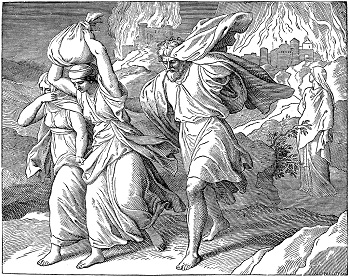
We are now in the remote preparation for Easter, the season of Septuagesima. Wednesday, February 26th is Ash Wednesday, which begins our lenten fast. Elsewhere on this website the fast laws are published. Let us consider some other forms of fasting. One saint advises us to fast from sin, which is always a good idea. Lent is a good time to look into our hearts and see how much garbage of sin has piled up in there.
"And I heard another voice from heaven, saying: Go out from her, my people; that you be not partakers of her sins, and that you receive not of her plagues. For her sins have reached unto heaven, and the Lord hath remembered her iniquities." (Apocalypse 18:4-5)
We need to fast from the world. Some give up Facebook, during Lent, but that is not enough. Elsewhere in this Olive Tree we read about how people kept the Lord's Day holy in the early days of Traditionalism when it was possible to spend months without assisting at Mass. Notice the words Lord's Day. In many languages this is how the first day of the week is called, rather than the pagan Sunday in English.
Septuagesima and Lent is a good time to initiate or improve pious practices, such as reading Sacred Scripture, mediation and taking to heart what we have just read and applying it to our life, spiritual reading, spiritual conversations, etc. We need to live as if we are already in heaven, even though we are still on exile here on earth.
These holy seasons are also an excellent time to fulfill the duties of our state of life better. We have duties to Almighty God, to our families, to our neighbors, to our enemies and to ourselves. This is a good time to stop and think how well we are fulfilling these duties and make improvements.
We need to step away from the world as much as duty will allow, especially in the holy seasons of Advent, Septuagesima and Lent. What has happened to all of us, we have become tainted by the world. The world is a cesspool, a sewage lagoon. And it does not matter how you get into a cesspool, weather by jumping, falling or being pushed in, you will get very dirty and stink. We have to live in the world. Every time we leave our home, we go out into a stinky world. In fact, we have machines that let us bring the world into our homes and make them stink as well. Let us consider this well. We are immersing ourselves in the world, even when we don't have to be in it.
And so, let us consider another fast, a fast from the world. Let us considering taking a whole day, beginning when we go to bed the evening before until we rise the day after and abstain completely from the world. No telephone, tablet, computer, etc. Let us take this time to immerse ourselves in spiritual things by making a Day of Recollection. The best thing to use is a book, and the Bible is an excellent one. There are many books in reprint that were written by the Saints. Husbands and Wives, help each other to make a day of recollection. One of you take over taking care of the children and other household duties, while the other prays, then switch roles. Heads of households, make sure all of your family have an opportunity to retire to recollection daily and to a day of recollection. In fact, you may consider giving your family a day of recollection, as it is your duty to see to the spiritual needs of your wife and family.
Now to some practical points. Just as there are things to consider in the heart, (Jeremias 12:11) there are things we should not be considering and this includes anything happening today in the Church or in the world. These are distractions. We are retiring from the world in order to focus on the best part as Mary Magdalene did. (Luke 10:42)
We should observe silence as much as possible. Ideally there should be no conversations. If this is not possible, then they need to be reduced to the minimum necessary to transact necessary business.
The purpose of a day of recollection is to retire from the world and become spiritual. We should leave with a practical resolution to live the Catholic way of life better than we have been before a day of recollection. We should return to this daily or at least once a week in our daily meditation. The Lord's Day is a good time to step away a little longer from the world in order to devote ourselves to spiritual things and review where we are at.
A day of recollection should not be a once in a life time event. Some of us may only be able to make a week long retreat rarely, but we should be able to make time on a regular basis to make a day of recollection. Some might want to devote the first Lord's Day or Saturday of the months. Others may wish to retire around the Ember Days for a day of recollection. In today's world, retiring often from the world is necessary to remain spiritual. Lukewarmness is a great danger in today's world as the whole world is designed to lead us to lukewarmness.
"But because thou art lukewarm, and neither cold, nor hot, I will begin to vomit thee out of my mouth." (Apocalypse 3:16)
This is why so many churches stink on Sunday mornings, there is so much vomit sitting in the pews. We must be an air fresh ner in our churches and a light to the world. "So let your light shine before men, that they may see your good works, and glorify your Father who is in heaven." (Matthew 5:16) We cannot brings others to true conversion and repentance, until we have repented our own selves.
John the Baptist said: "Do penance: for the kingdom of heaven is at hand." (Matthew 3:2) A footnote in the Bible says: "Penance: Which word, according to the use of the scriptures and the holy fathers, does not only signify repentance and amendment of life, but also punishing past sins by fasting, and such like penitential exercises."
Let us pray for each other as we are retiring from the world and indeed every day.
The Funny Pharmacy
A joyful mind maketh age flourishing: a sorrowful spirit drieth up the bones. - Proverbs 17:22







Is it your opinion that a priest can never effectively recant from celebrating the NO mass and regain non heretical status?
No, a priest can return to the Church by renouncing his heresy, and seeking absolution from the Pope. He must approach either the Pope or his Local Ordinary (Bishop), who can absolve him from excommunication. However, only the Pope can restore such a man to functioning as a priest again.

The Pope Speaks: February 2020
How We Kept the Lord's Day Holy in the 1970's

In November of 1972 shortly after my 13th birthday, Father James Dunphy came in for Mass two weekends in a row to Oklahoma City. At the time I was in eighth grade in Rosary School. On Tuesday after the second Sunday Mass Mom drove me to school and looked up at the Saint Francis Church, which my school was connected with, and said to herself: "I am never going into that church again." She arrived home as Dad was starting his first cup of coffee, because he got up later since he worked four to midnight. Mom informed Dad of her decision and he replied: "It is about time." After dinner Mom took me into the living room, which made me immediately know that what we were going to discuss was quite important, since we spent most of our time in the den, saving the living room for special occasions. She explained things to me, and I had no problem.
The next Sunday morning, we all got up as usual, got dressed in our Sunday best and proceeded to the living room to say the Mass prayers before going to the catechism class Mom taught at and Dad and I attended. Dad sat in on the high school class, because he was a recent convert and wanted to know his faith better.
In 1972, the Latin Mass was not readily available. Only a few cities actually a priest in residence. About the only priest in the Bible Belt was Father Dunphy from Saint Louis. He went border to border and coast to coast in the United States from the late 1960's until he was grounded by his superiors in Saint Louis in June of 1974. (His story is for another time.) We would see him four to five times a year, which was the only time we could actually assist at Mass.
Father Dunphy came in the first time in November of 1971 to Oklahoma City and many in the catechism class started in the mid 1960's assisted at his first Mass in Oklahoma City. My family was the third family to depart the Novus Ordo. All of us, who left the Novus Ordo took our obligation to worship God quite seriously, especially the obligation to keep the Sabbath holy. We did not all do the same thing on Sunday mornings, but everyone did something. We already had one anchor, out catechism class on Sunday mornings, during the school year. However, we realized this was only part of keeping the Sabbath holy. We no longer had a Mass to assist at on Sunday mornings with rare exceptions.
In the fall of 1973 we met Father Dan Jones from Colorado, who introduced us to a priest who had a chapel in the basement of a home on the north side of Chicago. Father Daly offered to come in once a month on Thursday before first Friday for evening Mass on Thursday and morning Mass on Friday. Soon he was able to come on Thursday and stay through Monday, so once a month we had Sunday Mass. In 1975, I realized I would be able to assist at fifty-nine Masses, during the year, and dedicated them to fulfilling part of my Sunday obligation. (53 Sundays and 6 holy days of obligation.) However, I realized that the obligation goes far beyond simply assisting at Mass. Mass is only part of the obligation, binding under Church law. Of course, the Church law does not bind, if it is impossible to fulfill. However, the Third Commandment binds.
After Father Daly stopped coming in in early 1975, we asked the SSPX (Society of Saint Pius X), if they could send us a priest some time. They sent Father Hector Bolduc, who had been ordained in 1974. He was teaching at the SSPX seminary in Armada, Michigan at the time. He came to us, and soon through people we knew in other cities moved to the Houston area, when he traveled from on a circuit, bringing Mass weekly to several Mass centers. (We did not use the terms church or even chapel, because only the Bishop of the diocese can establish a church. The term Mass center was adopted, because it did not imply usurping authority that we did not have.)
By 1976, we had Sunday Mass most weeks. We rented a room for Mass in mid 1976 for a week day Mass, and advertised it in the Oklahoma City paper. The Bishop sent out a warning about that time that our Masses did not fulfill our Sunday obligation. Actually the bishop was right, and I knew it at the time. Mass only fulfills the obligation if it is celebrated in a church, a public oratory or outside. Masses elsewhere, such as in private chapels, do not fulfill the obligation even for those to whom the chapel is granted. This is why kings and queens would be found in a church on Sundays and other Holydays of Obligation. And this is the purpose of the law, to make sure we worship as a parish, even if we have privileges other days of the year. Of course, I did not believe that the Novus Ordo fulfills the Sunday obligation, because it is what Archbishop Lefebvre would call in 1976, a bastard mass.
Not being able to assist at Mass on the Lord's Day and other Holydays of Obligation made us take the Mass a lot more seriously. It also made us take our Faith and our obligation to sanctify the Lord's Day and other Holydays far more seriously.
When we got a permanent place for Mass and had Sunday Masses, a certain laxity flowed back into us. We still took things seriously, but fell back into '50's Catholicism, which one priest described as Mass on Sunday, fish on Friday and five dollars in the collection plate. Traditionalism was most fervent, when the Mass was not readily available, and we had to do things on our own to keep ourselves Catholic. Once Traditionalism got named and Traditionalists started obtaining church buildings, laxity soon engulfed us. By 1980, Traditionalism had mutated into something totally different than what it had begun as.
'50's Catholicism
We should consider what two of us call '50's Catholicism. It was Catholicism as it existed prior to Vatican II. This was a time, when laxity had taken over. Some priests were already trying to find ways to permit their penitents to use birth control, if they asked. Catholics were present on Sunday mornings at Mass, but they did not really assist at Mass. Even in the 1950's men would retire, during the sermon outside to smoke a cigarette, which is hardly what we should be doing on the Lord's Day. Of course,many of the sermons were not really worth listening to, as they had no substance.
In the 1950's the priesthood had become a career. The Church was falling apart. Yes there are stories of infiltration of the Church, but the infiltrators would not have been successful in damaging the Church, if Catholics had lived by the Gospels rather than compromising with the world as most did. As Saint Bernadette said: "I only fear bad Catholics." There is a lot of discussion about the Jews, the Masons, the Communists, as if eliminating these enemies of Jesus Christ would end our problems. No our problems come from with in. Our real enemy is our own laxity as Sacred Scripture reminds us: "But because thou art lukewarm, and neither cold, nor hot, I will begin to vomit thee out of my mouth." (Apocalypse 3:16) In conclusions, let us meditate on this, '50's Catholicism led to '60's apostasy, Vatican II and its perfidious spirit.


Saint John Cassian
On The Eight Vices
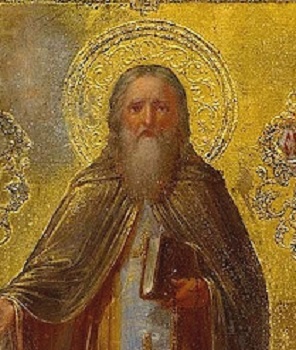
On Anger
Our fourth struggle is against the demon of anger. We must, with God's help, eradicate his deadly poison from the depths of our souls. So long as he dwells in our hearts and blinds the eyes of the heart with his somber disorders, we can neither discriminate what is for our good, nor achieve spiritual knowledge, nor fulfill our good intentions, nor participate in true life; and our intellect will remain impervious to the contemplation of the true, divine light; for it is written, "For my eye is troubled because of anger" (Psalm 6:7).
Nor will we share in divine wisdom even though we are deemed wise by all men, for it is written: "Anger lodges in the bosom of fools" (Eccles. 7:9). Nor can we discriminate in decisions affecting our salvation even though we are thought by our fellow men to have good sense, for it is written: "Anger destroys even men of good sense" (Prov. 15:1). Nor will we be able to keep our lives in righteousness with a watchful heart, for it is written: "Man's anger does not bring about the righteousness of God" (Jas. 1:20). Nor will we be able to acquire the decorum and dignity praised by all, for it is written: "An angry man is not dignified" (Prov. 11:25).
If, therefore, you desire to attain perfection and rightly to pursue the spiritual way, you should make yourself a stranger to all sinful anger and wrath. Listen to what Saint Paul enjoins: "Rid yourselves of all bitterness, wrath, anger, clamor, evil speaking and all malice" (Eph. 4:31). In saying "all" he leaves no excuse for regarding any anger as necessary or reasonable. If you want to correct your brother when he is doing wrong or to punish him, you must try to keep yourself calm; otherwise you yourself may catch the sickness you are seeking to cure and you may find that the words of the Gospel now apply to you: "Physician, heal thyself" (Luke 4:23), or "Why do you look at the speck of dust in your brother's eye, and not notice the rafter in your own eye?" (Matt. 7:3).
No matter what provokes it, anger blinds the soul's eyes, preventing it from seeing the Sun of righteousness. Leaves, whether of gold or lead, placed over the eyes, obstruct the sight equally, for the value of the gold does not affect the blindness it produces. Similarly, anger, whether reasonable or unreasonable, obstructs our spiritual vision. Our incensive power can be used in a way that is according to nature only when turned against our own impassioned or self-indulgent thoughts. This is what the Prophet teaches us when he says: "Be angry, and do not sin" (Psalm 4:4) - that is, be angry with your own passions and with your malicious thoughts, and do not sin by carrying out their suggestions. What follows clearly confirms this interpretation: "As you lie in bed, repent of what you say in your heart" (Psalm 4:4) - that is, when malicious thoughts enter your heart, expel them with anger, and then turn to compunction and repentance as if your soul were resting in a bed of stillness.
Saint Paul agrees with this when he cites this passage and then adds: "Do not let the sun go down upon your anger: and do not make room for the devil" (Eph. 4:26-27), by which he means: Do not make Christ, the Sun of righteousness, set in your hearts by angering him through your assent to evil thoughts, thereby allowing the devil to find room in you because of Christ's departure. God has spoken of this Sun in the words of His prophet: "But upon you that fear My name shall the Sun of righteousness arise with healing in His wings" (Mal. 4:2). If we take Paul's saying literally, it does not permit us to keep our anger even until sunset.
What then shall we say about those who, because of the harshness and fury of their impassioned state, not only maintain their anger until the setting of this day's sun, but prolong it for many days? Or about others who do not express their anger, but keep silent and increase the poison of their rancor to their own destruction? They are unaware that we must avoid anger not only in what we do but also in our thoughts; otherwise our intellect will be darkened by our rancor, cut off from the light of spiritual knowledge and discrimination, and deprived of the indwelling of the Holy Spirit.
It is for this reason that the Lord commands us to leave our offering before the altar and be reconciled with our brother (cf. Matt. 5:23-24), since our offering will not be acceptable so long as anger and rancor are bottled up within us. The Apostle teaches us the same thing when he tells us to "pray without ceasing" (I Thess. 5:17), and to "pray everywhere, lifting up holy hands without anger and without quarrelling" (I Tim. 2:8). We are thus left with the choice either of never praying, and so of disobeying the Apostle's commandment, or of trying earnestly to fulfill his commandment by praying without anger or rancor.
We are often indifferent to our brethren who are distressed or upset, on the grounds that they are in this state through no fault of ours. The Doctor of souls, however, wishing to root out the soul's excuses from the heart, tells us to leave our gift and to be reconciled not only if we happen to be upset by our brother, but also if he is upset by us, whether justly or unjustly; only when we have healed the breach through our apology should we offer our gift.
We may find the same teaching in the Old Testament as well. As though in complete agreement with the Gospels, it says: "Do not hate your brother in your heart" (Lev. 19:17); and: "The way of the rancorous leads to death" (Prov. 12: 28). These passages, then, not only forbid anger in what we do but also angry thought. If therefore we are to follow the divine laws, we must struggle with all our strength against the demon of anger and against the sickness which lies hidden within us.
When we are angry with others we should not seek solitude on the grounds that there, at least, no one will provoke us to anger, and that in solitude the virtue of long-suffering can easily be acquired. Our desire to leave our brethren is because of our pride, and because we do not wish to blame ourselves and ascribe to our own laxity the cause of our unruliness. So long as we assign the causes for our weaknesses to others, we cannot attain perfection in longsuffering.
Self-reform and peace are not achieved through the patience which others show us, but through our own longsuffering towards our neighbor. When we try to escape the struggle for longsuffering by retreating into solitude, those unhealed passions we take there with us are merely hidden, not erased; for unless our passions are first purged, solitude and withdrawal from the world not only foster them but also keep them concealed, no longer allowing us to perceive what passion it is that enslaves us. On the contrary, they impose on us an illusion of virtue and persuade us to believe that we have achieved longsuffering and humility, because there is no one present to provoke and test us.
But as soon as something happens which does arouse and challenge us, our hidden and previously unnoticed passions immediately break out like uncontrolled horses that have long been kept unexercised and idle, dragging their driver all the more violently and wildly to destruction. Our passions grow fiercer when left idle through lack of contact with other people. Even that shadow of patience and longsuffering which we thought we possessed while we mixed with our brethren is lost in our isolation through not being exercised. Poisonous creatures that live quietly in their lairs in the desert display their fury only when they detect someone approaching; and likewise passion-filled men, who live quietly not because of their virtuous disposition but because of their solitude, spit forth their venom whenever someone approaches and provokes them. This is why those seeking perfect gentleness must make every effort to avoid anger not only towards men, but also towards animals and even inanimate objects.
I can remember how, when I lived in the desert, I became angry with the rushes because they were either too thick or too thin; or with a piece of wood, when I wished to cut it quickly and could not; or with a flint, when I was in a hurry to light a fire and the spark would not come. So all-embracing was my anger that it was aroused even against inanimate objects.
If then we wish to receive the Lord's blessing we should restrain not only the outward expression of anger, but also angry thoughts. More beneficial than controlling our tongue in a moment of anger and refraining from angry words is purifying our heart from rancor and not harboring malicious thoughts against our brethren. The Gospel teaches us to cut off the roots of our sins and not merely their fruits. When we have dug the root of anger out of our heart, we will no longer act with hatred or envy. "Whoever hates his brother is a murderer" (I John 3:15), for he kills him with the hatred in his mind. The blood of a man who has been slain by the sword can be seen by men, but blood shed by the hatred in the mind is seen by God, who rewards each man with punishment or a crown not only for his acts but for his thoughts and intentions as well. As God Himself says through the Prophet: "Behold, I am coming to reward them according to their actions and their thoughts" (cf. Ecclus. 35:19); and the Apostle says: "And their thoughts accuse or else excuse them in the day when God shall judge the secrets of men" (Rom. 2:15-16). The Lord Himself teaches us to put aside all anger when He says: "Whoever is angry with his brother shall be in danger of judgment" (Matt. 5:22). This is the text of the best manuscripts; for it is clear from the purpose of Scripture in this context that the words 'without a cause' were added later. The Lord's intention is that we should remove the root of anger, its spark, so to speak, in whatever way we can, and not keep even a single pretext for anger in our hearts. Otherwise we will be stirred to anger initially for what appears to be a good reason and then find that our incensive power is totally out of control.
The final cure for this sickness is to realize that we must not become angry for any reason whatsoever, whether just or unjust. When the demon of anger has darkened our mind, we are left with neither the light of discrimination, nor the assurance of true judgment, nor the guidance of righteousness, and our soul cannot become the temple of the Holy Spirit. Finally, we should always bear in mind our ignorance of the time of our death, keeping ourselves from anger and recognizing that neither self-restraint nor the renunciation of all material things, nor fasting and vigils, are of any benefit if we are found guilty at the last judgment because we are the slaves of anger and hatred.

Saints from East and West
Saints whose feasts are celebrated this month

February 14 (Byzantine) - Saint Cyril.
The Holy Cyril, Teacher of the Slavs, and his older brother Methodius were by descent Slavs, born in Macedonia in the city of Soluneia (Thessalonica).
Saint Cyril received the finest of educations, and from age fourteen he was raised together with the son of the emperor. He early accepted the dignity of presbyter. Upon his return to Constantinople, he worked as a librarian of the cathedral church, and as a professor of philosophy. Saint Cyril successfully held debates with iconoclast heretics and with Mahometans.
Yearning for solitude, he set off to Mount Olympus to his older brother Methodius, but his solitude lasted only a short while. Both brothers were dispatched by the emperor Michael in the year 857 on a missionary journey to preach Christianity to the Khozars. Along the way they stopped off at Cherson and discovered there the relics of the Hieromartyr Pope Clement.
Arriving at the Khozars, the holy brothers spoke with them about the Christian faith. Persuaded by the preaching of Saint Cyril, the Khozar prince together with all his people accepted Christianity. The grateful prince wanted to reward the preachers with rich presents, but they refused this and instead asked the prince to free and send home with them all the Greek captives. Saint Cyril returned to Constantinople together with 200 such captives set free.
In the year 862 began the chief exploit of the holy brothers. At the request of prince Rostislav, the emperor sent them to Moravia for preaching Christianity in the Slavic language. Saints Cyril and Methodius by a revelation from God compiled a Slavonic alphabet and translated into the Slavonic language the Gospel, the Epistles, the Psalter and many Divine-service books. They introduced Divine-services in the Slavonic tongue.
The holy brothers were then summoned to Rome at the invitation of the pope. Pope Adrian received them with great honour. By nature sickly and of weak health, Saint Cyril from his many labours soon fell ill, and having taken the schema, he died in the year 869 at age 42. Before his death, he expressed last wishes for his brother to continue with the Christian enlightenment of the Slavs. Saint Cyril was buried in the Roman church of Saint Clement, whose own relics also rest there, brought to Italy from Cherson by the Enlighteners of the Slavs.

February 19 - Saint Conrad of Piacenza.
Conrad belonged to a noble farnity of Piacenza, where he lived with his wife, to whom he was much attached. One day when he was out hunting he ordered his attendants to fire some brushwood to drive out the game. This they did, but a strong wind drove the flames into the cornfields, and the conflagration spread to the neighbouring villages. Conrad, unable to check the fire, returned home secretly with his attendants, and they said nothing about their share in the disaster.A poor man who was found picking up sticks near the fire was accused of having started the fire and sentenced to death. Upon hearing this, Conrad was filled with remorse and hastened to exculpate the accused and to give himself up, explaining how it had all come about. He was ordered to make good the damage which his carelessness had caused. The fine thus inflicted swallowed up nearly all his possessions as well as his wife's dowry. This caused them to think very seriously, and they came to the conclusion that the finger of God was to be seen in what had happened. They agreed to give away to the poor whatever was left them, and, whilst his wife entered a convent of Poor Clares, Conrad put on the garb of a pilgrim and attached himself to some hermits who lived under the rule of the Third Order of Saint Francis, to which he was admitted. From that time he led a life of extraordinary piety, and soon his fame began to bring him visits from his former fellow-citizens. To avoid this publicity he decided to leave the neighbourhood; he crossed over to Sicily and took up his abode in the valley of Noto, where he dwelt for thirty years, partly in the Hospital of Saint Martin and partly in a hermitage founded by William Bocherio, another nobleman who had become an anchorite. Towards the end of his life Saint Conrad, to obtain more complete solitude, betook himself to the grotto of Pizzoni, three miles from Noto.
In spite of all attempts to hide himself, the fame of his sanctity spread far and wide, and when a famine occurred numbers of people came to him to implore his help. Through his prayers relief came at once to the stricken inhabitants, and from that time his cell was besieged by sufferers of all kinds. The Bishop of Syracuse himself visited him, and it was told afterwards that while his attendants were preparing to unpack the provisions they had brought, the bishop had asked Saint Conrad with a smile whether he had nothing to offer his visitors. The holy man replied that he would go and look in his cell, from which he emerged carrying delicious newly-made cakes which the bishop accepted as miraculous and for which he gave praise to God. Some time before his death, Conrad returned the bishop's visit and made a general confession to him; as he arrived he was surrounded by birds who fluttered round him and afterwards escorted him back to Noto. When his last hour was come, he lay on the ground in front of the crucifix and prayed for his benefactors and for the people of Noto. He was buried in the church of Saint Nicholas there and his tomb became a favourite shrine at which many miraculous cures took place. He is more particularly invoked for ruptures on account of the large number of people who owed their recovery from hernia to his intercession. The cultus of Saint Conrad has been approved by three popes.


Books to feed your faith!
Charity: A Commentary on I Corinthians 13 by Saint Alphonsus
$9.99 paperback / $0.99 Kindle
Charity is patient, is kind: charity envieth not, dealeth not perversely; is not puffed up; Is not ambitious, seeketh not her own, is not provoked to anger, thinketh no evil; Rejoiceth not in iniquity, but rejoiceth with the truth; Beareth all things, believeth all things, hopeth all things, endureth all things. (I Corinthians 13:4-7) Saint Paul wrote wonderfully about charity in the 13th chapter of First Corinthians. Saint Alphonsus takes these words and gives a simple view of the Catholic way of life and an excellent introduction into the spiritual life. This is excerpted from his work, The Holy Eucharist, which has been excerpted from The Complete Works of Saint Alphonsus, which was compiled and translated by Father Eugene Grimm. (1835-1891)
Lenten Instructions from the Roman Breviary
$9.95
The Roman Breviary is full of inspirational prayers and lessons. These lessons are compiled from the lessons of Matins. On Sundays and greater feasts Matins consists of three nocturns. Each nocturn consists of three psalms and three lessons. The first nocturn has lessons from Sacred Scripture. Since the Bible is readily available, this is omitted from this work. The second nocturn on the feast of saints gives their life story. It is these stories, which are most instructive. On Sundays, these lessons are an explanation either of the current Scripture or some other inspirational instruction and these are included here. The third nocturn is on the day's Gospel. The first lesson begins with a short quote from the Gospel of the day, followed by the beginning of the instruction. These are included here. On smaller feasts and ferial days, there is only one nocturn of nine psalms and three lessons. In Lent, these lessons are on the day's Gospel, while on other ferial days they are from Scripture. On minor feast days, the first two are from Scripture, the third on the day's feast. In Lent there are forty different Gospels read, and the lessons on these form the bulk of this work. The lessons in the Breviary come from the Fathers of the Church and are quite instructive. This work would serve as a good companion to Sunday Sermons of the Great Fathers, as it covers material not contained in this other excellent work. The Fathers of the Church bring out points we may not have considered in our meditations on the daily Gospels. We pray all find these instructions as fruitful as I have. We have included the instructions for the three Sundays prior to Ash Wednesday, Septuagesima, Sexagesima and Quinquagesima, as they form a remote preparation for the commemoration of the mysteries of our Redemption at the end of Holy Week.
The Liturgical Year: Septuagesima (Volume 4)
$17.95
This is a fifteen volume set, which is being brought back into print for the edification of the Faithful. Anyone who wishes to appreciate the timeless Tridentine Mass and liturgy will find this set a valuable aid in that endeavor. Dom Gueranger has produced a most excellent work, which began the liturgical movement. We pray that this set of books will bring many more to a true appreciation of the Latin Mass and the Divine Office of the Catholic Church. At one time, under the impulse of that Spirit, which animated the admirable Psalmist and the Prophets, she takes the subject of her canticles from the Books of the Old Testament; at another, showing herself to be the daughter and sister of the holy Apostles, she intones the canticles written in the Books of the New Covenant; and finally, remembering that she, too, has had given to her the trumpet and harp, she at times gives way to the Spirit which animates her, and sings her own new canticle. From these three sources comes the divine element which we call the Liturgy. The Prayer of the Church is, therefore, the most pleasing to the ear and heart of God, and therefore the most efficacious of all prayers. Happy, then, is he who prays with the Church, and unites his own petitions with those of this Spouse, who is so dear to her Lord, that he gives her all she asks. It was for this reason that our Blessed Saviour taught us to say our Father, and not my Father; give us, forgive us, deliver us, and not give me, forgive me, deliver me. Hence, we find that, for upwards of a thousand years, the Church, who prays in her temples seven times in the day, and once again during the night, did not pray alone. The people kept her company, and fed themselves with delight on the manna which is hidden under the words and mysteries of the divine Liturgy. Thus initiated into the sacred Cycle of the mysteries of the Christian year, the faithful, attentive to the teachings of the Spirit, came to know the secrets of eternal life ; and, without any further preparation, a Christian was not unfrequently chosen by the Bishops to be a Priest, or even a Bishop, that he might go and pour out on the people the treasures of wisdom and love, which he had drunk in at the very fountain-head. For whilst Prayer said in union with the Church is the light of the understanding, it is the fire of divine love for the heart. The Christian soul neither needs nor wishes to avoid the company of the Church, when she would converse with God, and praise his greatness and his mercy. She knows that the company of the Spouse of Christ could not be a distraction to her. Is not the soul herself a part of this Church, which is the Spouse? Has not Jesus Christ said: Father, may they be one, as we also are one? and, when many are gathered in his name, does not this same Saviour assure us that he is in the midst of them? The soul, therefore, may converse freely with her God, who tells her that he is so near her; she may sing praise, as David did, in the sight of the Angels, whose eternal prayer blends with the prayer which the Church utters in time.
For More Good Traditional Catholic Books:


Lentil Vegetable Soup with Wild Rice
A satisfying and nutritious soup that can be served on days of fast and abstinence.
Ingredients
3/4 cup lentils, sorted and rinsed
3/4 cup diced carrot
3/4 cup diced celery
3/4 cup chopped onion
1/4 cup wild rice
1/4 cup converted rice (like Uncle Ben's)
2 cloves garlic, minced
1 teaspoon dried oregano
1/4 teaspoon dried thyme
5 cups water
4 teaspoons vegetable bouillon seasoning
1 bay leaf
1 14-1/2 oz. can cut up tomatoes
1 tablespoon Worcestershire sauce
1 tablespoon apple cider vinegar
1/4 cup minced fresh parsley
2 tablespoons minced fresh basil, optional
V-8 or tomato juice or water, optional
Directions
Combine all ingredients on the list through the canned tomatoes in a large pot (do not add the Worcestershire sauce, vinegar, parsley or basil yet).
Bring to a boil, then simmer until lentils and rice are tender (about 35-45 minutes).
Remove the bay leaf. Scoop out about two cups of the soup and blend well in the blender.
Return the blended soup to the pot. Now stir in the Worcestershire sauce, the apple cider vinegar, the fresh parsley (and the fresh basil if using).
You should have about 8 cups of soup. If you don't have 8 cups, or if you prefer a thinner soup you can stir in some V-8, tomato juice, or water as you wish. Makes 4 servings, 2 cups each.
Traditional British Shrove Tuesday Pancakes

Ingredients
3/4 cup plus 2 tbsp (100 g) flour
1/8 tsp salt
1 egg, beaten
8 oz milk
2 tbsp limoncello or your favorite liqueur, or water
butter for pan
lemon wedges and sugar
Directions
Sift the flour and salt into a large bowl; make a well in the middle and add the beaten egg.
Stir in half the milk, working in the flour gradually until it begins to form a batter, then beat well and add the rest of the milk and liqueur or water.
Pour batter into a jug and let stand for about 15 minutes before making any pancakes. When batter has rested, heat a nonstick pan over medium high heat, add a little bit of butter to the center of the pan, stir the batter then pour in a small amount into the pan then swirl it so that it spreads thinly.
Cook for about one minute, then turn and cook the other side for about 30 seconds.
Place on a plate, drizzle with juice from a fresh lemon, sprinkle with sugar then roll or fold to eat immediately, or else keep the pancakes on a plate over simmering water to keep warm, then add the lemon juice and sugar. Continue adding a tiny bit of butter to the pan and cook the remaining batter.

Video sermons and instructions: Timeless timely truths for living the Faith
Fast Laws of the Catholic Church
Ash Wednesday 2013
Second Sunday in Lent 2014
Ep3 S1 How To Purify Our Minds

Encouragement for Today
Therefore encourage one another and build one another up.... I Thessalonians 5:11
We believe...
that through our assorted podcasts, audio downloads and devotional blogs, you will find an assorted Treasure Chest of...
Sermons
Devotionals
Scripture Studies
Catechism Lessons
Daily Blogs
...that will be a help in your faithful walk with the Lord.
LEARN MORE AT THE ENCOURAGEMENT FOR TODAY WEBSITE: https://www.encouragementfortoday.com
AMOEBA MIDWIVES
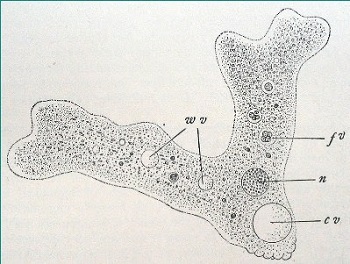
“By reason of her hard labour she began to be in danger, and the midwife said to her: Fear not, for thou shalt have this son also.”
Genesis 35:17
Ever since Old Testament times, midwives have been helping mothers during the birthing process. They are especially valuable should there be difficulties since they not only offer an extra set of hands, but experience in dealing with common problems. Some of the scientists who were studying amoeba behavior observed some very strange behavior which suggests that some amoebas, too, employ midwives.
The scientists were studying an amoeba that lives in the digestive tract of reptiles. As all amoebas, they reproduce by splitting in half. Scientists noted, however, that this particular species is not very good at it. Up to a third of the time, the amoebas fail to split. They begin the process but never manage to complete it. When that happens, the amoeba is doomed to exist as long as it can with two sets of genetic information. But as scientists watched, when an amoeba had difficulty dividing, other amoebas would move in on it and help the division process, thereby serving as a midwife. Further study revealed that the amoeba having difficulty dividing releases a chemical which apparently summons help to finish the process. The midwife amoeba have been seen traveling up to 40 times their own length to help in the birthing of a new generation.
The Bible teaches us that God cares for all of His creatures. Here we see that He provides even for the needs of the lowly amoeba. How much more does He love us and provide for our needs!

Catechism Catch-Up
The First Commandment-Lesson 3
"And the Lord spoke all these words: 'I am the Lord thy God, who brought thee out of the land of Egypt, out of the house of bondage.Thou shalt not have strange gods before me.Thou shalt not make to thyself a graven thing, nor the likeness of any thing that is in heaven above, or in the earth beneath, nor of those things that are in the waters under the earth. Thou shalt not adore them, nor serve them: I am the Lord thy God, mighty, jealous, visiting the iniquity of the fathers upon the children, unto the third and fourth generation of them that hate me:' " (Exodus 20:1-5)
Does anyone remember the Old Abbott and Costello skit they did? Abbott would say ,"Who's on first?", Costello would say, "I don't know." And then Abbott would say "I don't know is on second." and then.....well you no the rest of skit. It doesn’t matter too much who is in what position in our lives until we settle the matter of who is on first. In other words, we need to know who is in first place in our lives. This issue must be settled! If anyone, or anything, occupies first place in our lives ahead of God, than our lives are out of control and out of balance. God wants to tell us who must be on first if our lives are to be everything they can be for His glory. Actually even that skit does not give a good illustration of what God is trying to say. The question is not who is on first, or who is first in our lives. The question is who is controlling the game! Who has control of your whole life!
GOD’S REQUIREMENT
God’s requirement is very simple. He demands to be in first place in every area of our lives. He knows that all men have something they put before God Himself, and He demands that it be Himself.
"Adore not any strange god. The Lord his name is Jealous, he is a jealous God" (Exodus 34:14) God alone is worthy of our love and devotion. He will allow no intruder coming in and taking the place of what is rightfully God's position.
Origen- "When men try to seduce us to apostasy, it is useful to reflect upon what God wishes to teach us when he says, 'I am the Lord your God, jealous.' In my view, just as the bridegroom who wishes to make his bride love chastely so as to give herself entirely to him and beware of any relationship whatever with any man other than her husband, pretends, though he be wise, to be jealous-he uses this pretense as a kind of antidote for his bride-so the Lawgiver, especially when he reveals himself as the 'firstborn of every creature.' says to his bride, that he is a jealous God. In this way he keeps his followers from any pretended gods."
Some would ask, "Well, isn’t there only one God?" Yes, there is only one true God, but there are many false Gods! It has been said, "Our God is the thing, or the person, which we think most precious, for whom we would make the greatest sacrifice, and who moves our heart with the warmest love. He is the person, or thing, that if lost would leave us desolate." Even the heretic Martin Luther knew that there can be false Gods in our lives. "Whatever we make the most of is our God." – Martin Luther.
But don't take the heretics words as true. Listen to the Early Fathers:
Gregory of Nyssa- "He who says 'you should never worship a strange god' forbids us to worship another god, and the strange god is so called into contradiction to our own God. And who is the strange god? Surely he who is alien from the nature of the true God
Man, by nature, is a religious creature. He will find someone, or something, to give his worship to.
Often, things and people occupy first place in our lives. Notice some things we elevate to the status of God hood in our lives. If you do these things "You just might be a Idolater."
1. The God Of Pleasure
"For many walk, of whom I have told you often (and now tell you weeping), that they are enemies of the cross of Christ. Whose end is destruction; whose God is their belly; and whose glory is in their shame; who mind earthly things. (Philippians 3:18-19)
Pleasure is like a drug. It often requires more to get the same effect. It Can include: sensual things, the abuse of sex, sports, entertainment, etc. "Rather choosing to be afflicted with the people of God, than to have the pleasure of sin for a time" (Hebrews 11:25)
If Pleasure is your God...You might be and idolater.
2. The God of Possessions
"No man can serve two masters. For either he will hate the one, and love the other: or he will sustain the one, and despise the other. You cannot serve God and mammon." (Matthew 6:24)
The gift of grab dominates many lives. If you place money and things first... You might be an idolaters!
3. The God Of Personal Worth
Who changed the truth of God into a lie; and worshipped and served the creature rather than the Creator, who is blessed for ever. (Romans 1:25)
When a person feels that the world revolves around them, and that they must always come out on top, that person...just might be an idolater.
4. The God Of Plans And Projects
Anything that occupies the mind and life ahead of God is an idol! If you do this....you might be an idolater.
The list is practically endless. Man can make a God out of anything. Yet, we must allow ourselves no God but the Almighty!
If we conducted a poll and asked each person to name the person or thing that dominated their life, what would the answer be? Whatever it is, that thing or person is your God!
MAN’S RESPONSE To The First Commandment
Man can continue to place everything in the world before God. This is rebellion and will end in hell. Or, man can comply with God’s demands. To do so will result in a blessed life and a glorious eternity.
What, or who, do you see on the throne of your heart? Anything or anyone other than Jesus is an idol!
The only solution to idols is to bring them to God through the sacrament of confession and leave them before Him. He excels in destroying them and replacing them with His wonderful love, His presence and glory, and his grace and mercy. Remember, He will tolerate no one and no thing but Himself on the throne of your heart.
THE RESULTS OF DISOBEDIENCE
When we elevate anything, or anyone to the place of Godhood, we will find out too late that neither it, nor they, will be able to protect us from the awesome wrath of God.
"But thou, O Lord, shalt laugh at them: thou shalt bring all the nations to nothing." (Psalms 58:9/59:8)
A good illustration is when the Philistine god Dagon was in the presence of the Ark of the Covenant.
"And the Philistines took the ark of God, and carried it from Ebenezer unto Ashdod. And the Philistines took the ark of God, and brought it into the temple of Dagon, and set it by Dagon. And when the Ashdod arose early the next day, behold Dagon lay upon his face on the ground before the ark of the Lord: and they took Dagon, and set him again in his place. And the next day again, when they rose in the morning, they found Dagon lying upon his face on the earth before the ark of the Lord: and the head of Dagon, and both the palms of his hands were cut off upon the threshold: And only the stump of Dagon remained in its place. For this cause neither the priests of Dagon, nor any that go into the temple tread on the threshold of Dagon in Ashdod unto this day." (1 Samuel 5:1-5)
Judgment will always stalk the idolater.
Visiting the iniquity of the fathers upon the children, unto the third and fourth generation of them that hate me: (Exodus 20:5)
God is not saying that he will punish the children for the parent’s sins.
"The fathers shall not be put to death for the children, nor the children for the fathers, but every one shall die for his own sin." (Deuteronomy 24:16, see also Ezekiel 18:19-32)
He is saying that sin leaves it’s mark on our children! Children tend to resemble the environment they are exposed to. Things like patterns of abuse, the way we walk, the way we talk, alcoholism etc. Often, it takes generations to break the cycle established by the parent.
"Shewing mercy unto thousands to them that love me, and keep my commandments." (Exodus 20:6)
"Now the law entered in, that sin might abound. And where sin abounded, grace did more abound." (Romans 5:20)
We are all guilty to some degree of manufacturing little gods for ourselves. We may not have a statue or an image to which we bow down, but we do have habits, traditions, activities, people and possessions that we place ahead of God. This is idolatry and this is sin. No one, or no thing deserves your worship more than God Himself. Is He receiving it as he should? Is God Almighty your One and True God?
Why does the Catholic Church permit the use of statues for religious purposes in defiance of God's prohibition against the carving of statues in Exodus 20:4-5?
The Catholic Church does not defy any of God's commandments. Your question reveals an ignorance of the biblical facts surrounding statues. In Exodus 20:4 God condemned the carving of statues for the sake of worshipping them as idols--a blasphemy the Catholic Church also condemns. In Exodus 25:18-20, on the other hand, God commands Moses to carve statues for a religious purpose: two cherubim which would sit atop the Ark of the Covenant.
Notice that these angelic images were to serve such an exalted purpose (not because the statues themselves were in any way intrinsically exalted but because of the use to which they would be put) that God was very exacting in the instructions he gave Moses as to the materials to be used and the posture in which they were to be carved. Similar divine commands to carve statues and embroider images of various religious objects are found in Exodus 21:6-9, Numbers 21:6-9, 1 Kings 6:23-28, and 1 Kings 7:23- 39. In each case, the statue or embroidered image was intended by God for a religious use.
Although the worship of anything, not just statues, in place of the True God is idolatry, there are times when statues are not just tolerable but recommended. Just as those Old Testament statues were ordered fashioned by God to reminded the Israelites of heavenly realities, Catholic statues of Jesus and the angels and the saints serve the same purpose. (https://www.catholic.com/qa/how-can-the-church-allow-statues-when-exodus-20-forbids-it)
Living Catholic:
God Needs Women
The Catholic practice of assigning a special devotion to each month goes back to the early 16th century. I would say that the best known of those devotions is probably the dedication of May as the month of the Blessed Virgin Mary. Also in the month of May we celebrate our mothers. Lately, when you read see or hear the news, it seems that woman have been put into the limelight. With this in mine I wanted to talk a little bit in this editorial about Gods desire for women.
God needs women today.
Women who will faithfully portray through their lives, the glory that He originally intended to manifest through a woman, when He created Eve.
When God made Eve, it was in order that she might be a helper suitable for man (Genesis. 2:18). The glory of this ministry is seen, when we notice that the title of Paraclete, which means 'Helper', is what Jesus used to refer to the Holy Spirit as well (John. 14:16)!
As the Holy Spirit invisibly and silently, yet powerfully helps the believer, even so the woman was created to help the man. The ministry of the Holy Spirit is 'behind the scenes'. So is the woman to be.
The life of Jesus also is an example to woman; for God's Word states that man is the woman's head in exactly the same way as God (the Father) is the head of Christ. Listen to the words of Paul in I Corinthians 11:3. “But I would have you know, that the head of every man is Christ; and the head of the woman is the man; and the head of Christ is God.” Jesus always acted in submission to His Father. A God-fearing woman will act likewise in relation to her husband. Eve's mistake in the garden of Eden was that she failed to consult her husband before she made a decision. Thus Satan seduced and deceived her as it says in (1 Timothy 2:14).
Where Eve failed, God calls Christian wives today to manifest the glory of submission to their husbands, exactly as Jesus was to the Father and as the church is to Christ.
Sin entered the universe through the rebellion of Lucifer. Salvation came through the submission of Christ. The spirit of humble submission to God's authority is the greatest power that there is in the universe - for it is the Spirit of Christ. That Spirit conquered all the spirits of rebellion on the cross. When a wife submits to her husband, she is actually submitting to the authority of God's Word, which commands her to do so; and she is then being influenced by the greatest power in the universe. Even unbelieving husbands can be won over by that power. 1 Peter 3:1,2 says, "In like manner also let wives be subject to their husbands: that if any believe not the word, they may be won without the word, by the conversation, of the wives (or the way the wife lives). Considering your chaste conversation with fear."
Here is where Satan deceives the woman again. As he led the angels astray, he leads the woman astray - through the spirit of rebellion. According to Proverbs 21:19, "it would be better to live in a dessert then with a rebellious, quarrelsome and fretful woman." In other words. It is worse to live with that kind of woman then it is to live in a barren desert! On the other hand, a submissive, excellent and virtuous wife, is as a crown to her husband which makes her home into a palace. (Proverbs 12:4). Your home can either be a palace or a place worse then a desert, spiritually speaking. It all depends on the type of wife that you are. No wonder God puts a great price on women who have a meek (gentle) and a quiet spirit (1 Peter. 3:4).
Proverbs 31:10-31 describes some of the characteristics of this virtuous wife. Her heart, hands and tongue are described as excellent.
Nothing is mentioned about her physical beauty or her feminine charms, for these are declared to be worthless and vain (v. 30). It would be an excellent thing if all women and young girls, and especially young men considering marriage, realized this fact.
The virtuous woman described here, has a heart that fears God (v. 30). This is the foundation for her whole life. She works with her hands, stitching clothes, cooking meals, planting trees and helping the poor (v. 13-22). She uses her tongue at all times with kindness and wisdom (v. 26). She is God-fearing, hard-working and kind - even if she is not beautiful on the outside. The glory of God is manifested through her pure heart, rough hands and soft tongue. (Worldly women, in contrast, have an impure heart, soft hands and a rough tongue!). It is in these areas that God looks for women today to manifest His glory.
As a wife, this virtuous woman is a true helper to her husband. She does him good consistently till the end of her life - not in fits and starts (v. 12). In other words, she never loses her first love for him. She also adjusts herself to his vocation and calling in life, supplementing his income with her own quiet labors at home, being thrifty and careful in finances, so that no money is wasted. No wonder her husband praises her saying that of all the women in the world she is the best (v. 29). Such a woman certainly deserves to be praised publicly too (v. 31), for she has understood the glory of her calling as a woman. Because of lack of time I would like to briefly mention a few other ways that Gods glory is seen in a woman. I would encourage you to read over the scripture references that is given.
The glory of God is seen in a woman who has seen her calling as a home-maker. (Titus 2:5)
The glory of God is seen in a woman's calling as a Mother.
Adam called his wife 'Eve', because she was a mother. In the pure light of God's presence, in Eden, he knew clearly what his wife's calling was. Eve knew it as well. Sin and human traditions (influenced by Satan) have now, however, clouded women's understanding, so that she no longer sees her glory as a mother. Children are now called by the Satanic name of 'accidents', when God calls them 'gifts' (Psalms 127:3). They are also considered to be a 'nuisance', when God considers them to be a 'blessing' (Psalms 127:5; 128:4). This is but another indication of how far, even so-called Christians have drifted away from God and become Satanic in their thinking!
A woman's primary witness for Christ, as we have seen, is by being a man's helper and a mother to her children. But God also calls her to be a witness by her mouth.
Mary Magdalene was the first witness of the risen Christ. She was one who testified about what she had seen and experienced. Every God-fearing Catholic woman, should take there responsibility of giving the good news of Christ to those with whom she is in contact - relatives, friends, neighbors, etc.
Prayer is one of the primary ministries that all Catholic woman can engage in, for the building of the Church.
God is certainly looking today for women who will engage in secret prayer for the fulfillment of His purposes. Women can prophesy too. Acts 2:17,18 clearly states that when the Spirit is outpoured, both men and women will prophesy. This is part of a woman's privilege under the new covenant. What do we mean by prophesy? We mean that she can share God's word in a spirit of meekness. Older women are exhorted to teach the younger sisters practical matters related to their conduct at home (Titus 2:4,5).
The glory of God is seen in the woman wearing a covering. The covering of a woman's head (taught in 1 Corinthians 11:1-16) is meant to symbolize:
(a) that man is the image and glory of God
(b) That the woman is the glory of man.
Not only does the head covering or the mantillas show the glory of God , but the long hair of the woman shows the glory of God.
A woman is also to be a faithful witness for Christ through her clothing. The Holy Spirit urges women to dress modestly and discreetly. (1 Timothy.2:9-10; 1 Peter3:3). Clothes are meant to cover a woman's body, not to expose it. No God-fearing woman will ever wear clothes that are cut and 'shaped' according to the immodest fashions of the women of the world. They are marks of worldly women, not of the disciples of Jesus Christ. (Read Isaiah.3:16-24 carefully, to see how God denounces the dress fashions of the worldly daughters of Zion).
Satan is eager to destroy the God-appointed distinction between the sexes. And he has got 21st-century women to act and behave like men in many ways. As well as Men acting and behaving like women. Domineering wives and women “priests” are all part of the drift of Christendom's women further and further away from God and His Word.
In the midst of all this, God needs women who will stay within the boundaries that He has been laid down in His Word, and taught to us through the centuries by the Fathers of the Church. God needs women who will manifest the true glory of womanhood throughout their lives. Determine with all your heart that you will be a woman after God's own heart, in these last days, in the midst of a sinful and adulterous generation and a compromising Christendom.
God will give you grace for this, if you earnestly desire it yourself.
To Learn More Principles For Life Go To: Resources: Principles of Life

Pray for the Holy Father! Pray with the Holy Father!
-
Your prayers are asked this month and every month for the intentions of the Holy Father, Pope Michael.
- Pray for the physical needs of the missionary work of the Church! One of our vehicles needs new tires to stay on the roads and to help us do the work of the Church! (Consider making a Donation to help, if you can!)
- Pray especially that Holy Ghost inspires and helps us prepare spiritual manuals and days of recollection to make available to all.
-
Keep in your prayers our Podcast Ministry, a new way to reach out in the missionary work of the Church! We ask for prayers for our other activities world wide. We have made good contacts in the Philippines and Japan and ask prayers that these contacts will bear much fruit for the salvation of souls.
-
Be sure to keep St. Helen Catholic Mission in your prayers. Why not go on over to the site now and see what they have to offer and how you might be able to help!
-
Also we ask you to keep in prayer our increasing missionary work in the United States and elsewhere.
-
Your prayers are asked for Father Francis Dominic as he continues the important work entrusted to him within the Church. In February he will be in Florida for 15 days speaking at a camp ground retreat.
-
Pray for those outside the Church and those who do not know God, that they may see the light of grace and be led safely home to the refuge of the Holy Catholic Church.
-
As always, we also ask that you pray for yourself! Never forget your own state of soul. God is calling you to His service in His love. We know that our Lord can count on you to answer.
-
We are all praying especially for you, too. May you correspond with every grace of God!
-
In what other needs or intentions may we pray for you? Let us know!
-
Let us remember that the Church runs on prayer. Without your prayers, God will not work in hearts and souls to bring them to a knowledge of the truth. (I Timothy 2:4)



To Donate by Mail:
Our address is
Vatican in Exile
829 NE Chester
Topeka, Kansas 66616
Make Checks payable to:
Vatican in Exile

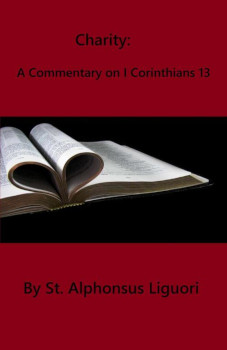

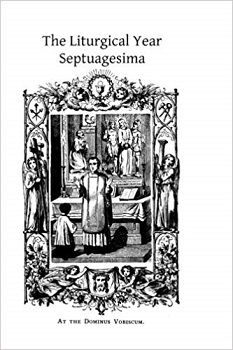







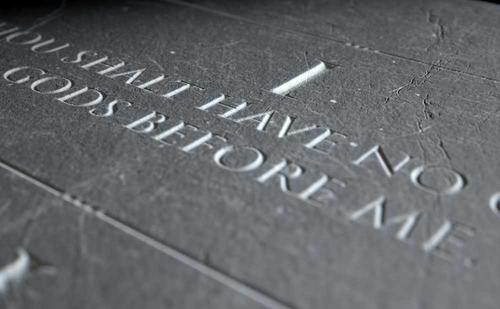
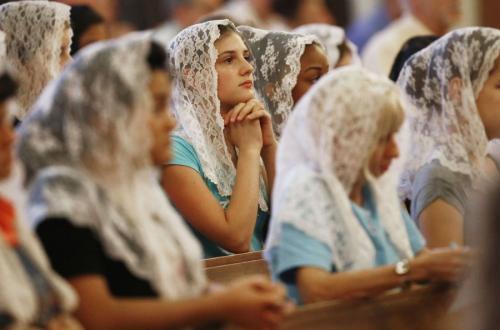



 Follow
Follow


